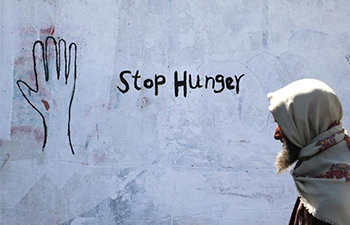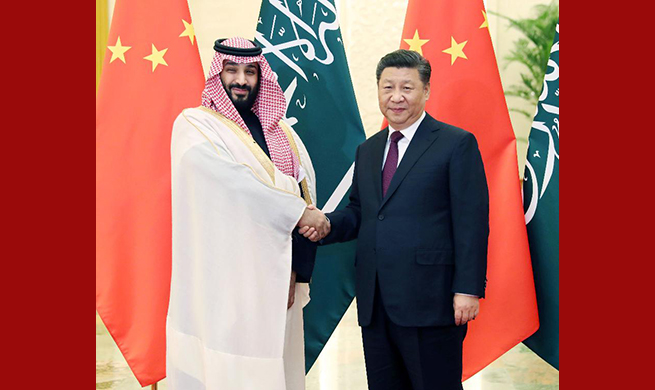RAMALLA, Feb. 22 (Xinhua) -- Israel's approval to cut more than 138 million U.S. dollars of the Palestinian tax revenues threatens to intensify confrontation with the Palestinian leadership which faces limited options as its financial crisis deepens.
Palestinian observers warned that the Palestinian Authority will face the risk of gradual collapse if Israel carries out its decision in view of its already budget deficit and a drop in international aid.
The Israeli cabinet said on Sunday that it was freezing the transfer of about 138.22 million dollars to the PA.
The Security Cabinet issued a statement saying the decision followed a law passed by the Knesset (parliament) last July, calling on the government to withhold these funds.
The law was approved in response to the Palestinian Authority's transfer of payments to families of prisoners jailed in Israel for attacking Israelis.
The monthly customs revenue that Israel collects on behalf of the Palestinian Authority amounts to more than 222 million dollars.
Palestinian President Mahmoud Abbas accuses Israel of "evading all signed agreements."
The development came against the deterioration of the relations between the Palestinian Authority and Israel for years after the last peace negotiations between them halted in 2014.
Hani al-Masri, director of the Ramallah-based Masarat Center for Research and Studies, believed the implementation of the decision to deduct tax revenues threatens more than ever to destroy the Palestinian Authority.
"The recent Israeli decision comes in line with the new changes that have accompanied Donald Trump's victory in the U.S. presidency and the adoption of a more radical U.S. policy in support of Israel than previous governments," al-Masri told Xinhua.
"We are in front of a new policy that might lead to dismantling the Palestinian Authority once implemented," he added.
He stressed that this policy aims at forcing the Palestinian authority to accept the requirements of Trump's peace deal which works to end its remaining political roles.
The Palestinians have been boycotting the Trump administration since it recognized Jerusalem as Israel's capital and moved the U.S. embassy in Israel to the city in May 2018.
Since the negotiations stalled in 2014, Israel has at times withheld money as a way of protest or pressure.
However, it coincided this time with a financial blockade imposed by the U.S. government, and a 70-percent decline in international financial aid.
The Palestinian Authority faces the risk of increasing its budget deficit to 700 million dollars, amid limited resources and revenues, posing a major challenge to its ability to meet its obligations.
Samir Abdullah, director of the Ramallah-based Mas Economic Research Center, said the Palestinian Authority is "in serious danger of going bankrupt financially."
Abdullah explained that Israel's deduction of large amounts of tax revenues will significantly increase the Palestinian budget deficit without precedent.
He also warned that Palestinian acceptance of the Israeli deduction from tax revenues could open the door to further cuts in the future.
Mahmoud al-Aloul, deputy chairman of Abbas' Fatah Party, has announced a series of decisions, including the boycott of Israeli goods to counter the move.
Al-Aloul told the official Voice of Palestine radio that the decisions were taken during a meeting of the Palestinian leadership held on Wednesday in Ramallah under the chairmanship of Abbas.
A committee was formed to prepare a list of Israeli products to be replaced with local alternatives, he said.
He also announced that the PA will approach international courts to sue Israel for its decision to deduct Palestinian cash, adding that a Palestinian delegation was formed to urge the Arab countries to provide a financial safety network for the Palestinian authority.
Mohammed Shalaldeh, a professor of international law at Al-Quds University in the West Bank, said Israel's decision to cut tax revenues is a flagrant violation of international law and international humanitarian law.
He explained that the Palestinians can approach the International Criminal Court "because what Israel is doing is equivalent to a war crime against the civilian population and prisoners."
The professor highlighted the possibility of raising the Israeli decision at the UN institutions as a humanitarian issue to which the Sixth and Fourth Geneva Conventions apply.

















